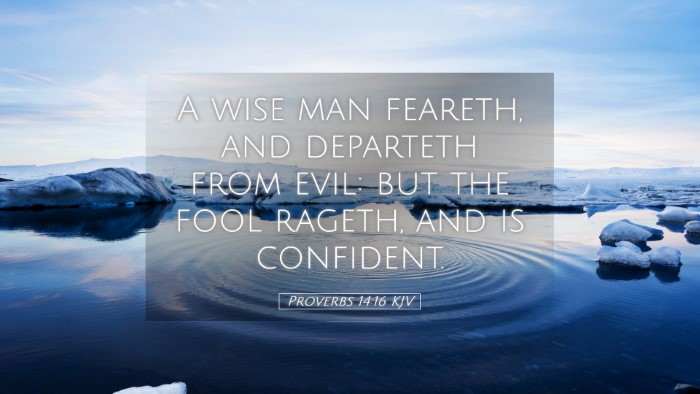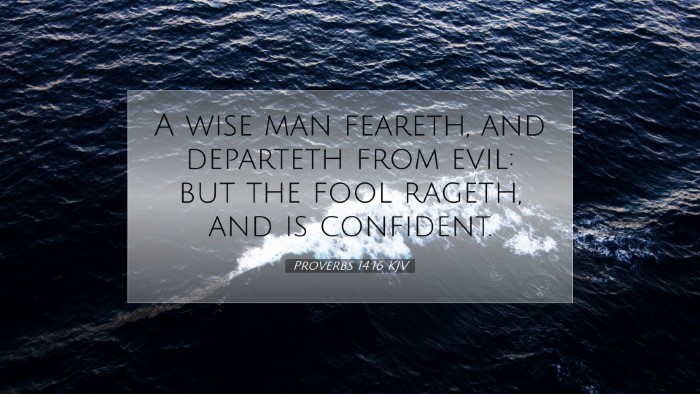Commentary on Proverbs 14:16
Bible Verse: “A wise man feareth, and departeth from evil: but the fool rageth, and is confident.” (Proverbs 14:16 KJV)
Introduction
The Book of Proverbs, attributed largely to King Solomon, offers a rich tapestry of insights and practical wisdom for everyday life. Proverbs 14:16 presents a stark contrast between the wise and the foolish, encapsulating key themes that resonate with theological reflection and moral instruction. This commentary draws upon the insights of prominent public domain commentators such as Matthew Henry, Albert Barnes, and Adam Clarke.
Thematic Analysis
This verse can be dissected into two main components: the demeanor of the wise man in juxtaposition to that of the fool. It speaks to fundamental truths about human behavior, decision-making, and the nature of wisdom.
- The Fear of the Wise: The wise man is characterized by fear – a reverent awe of God and an awareness of the moral implications of his actions. Henry elucidates this as a profound respect for divine authority, which leads to prudence and caution.
- Departure from Evil: The wise man not only fears but also acts; he departs from evil. Clarke emphasizes that this departure signifies a deliberate choice to steer clear of sin, underscoring the active nature of wisdom.
- The Confidence of the Fool: In contrast, the fool's boldness reflects a misguided assurance. Barnes notes that the fool acts without regard for the consequences, embodying a tragic naivety that often leads to self-destruction.
Verse Breakdown
“A wise man feareth”: The fear referenced here is not a paralyzing dread but a healthy respect for God that compels one to act wisely. It involves recognizing one’s limitations and the reality of sin. As outlined by Henry, this fear is the beginning of knowledge (Proverbs 1:7) and aligns with the broader biblical perspective of reverence toward God.
“And departeth from evil”: The active response to this fear entails turning away from wrongdoing. Henry discusses the notion that wisdom is displayed through actions. The wise individual does not flirt with sin but makes conscious choices to avoid it, reflecting a deep understanding of its detrimental effects.
“But the fool rageth”: The foolish individual exhibits a reckless spirit, often marked by anger or defiance. Clarke suggests that this rage can stem from a lack of self-awareness and an overestimation of one’s moral fortitude. The fool not only engages with evil but does so with audacity, as if impervious to its dangers.
“And is confident”: This confidence is devoid of true wisdom; it is a misplaced trust in oneself that blinds the fool to the pitfalls of sinful behavior. Barnes points out that this confidence is often temporary and can lead to disastrous outcomes when the consequences of evil are realized.
Practical Implications
The implications of this verse stretch beyond mere observation of behavior; they invite a profound moral reflection on the nature of wisdom and foolishness in contemporary life.
- Fear of God: In pastoral ministry, cultivating a proper fear of the Lord is essential. This is foundational to discipleship—it calls for an understanding of God’s holiness and justice, encouraging believers to live in ways that honor Him.
- Holiness in Action: The wise man’s departure from evil serves as a model for congregational life. Church leaders are called to foster environments that promote holiness and resist temptation, emphasizing the importance of practical righteousness in their teachings.
- Recognizing Foolishness: For students and scholars, understanding the characteristics of foolishness is critical. The scripture invites an introspective look into our own lives—how often do we exhibit the same traits of confidence in our wisdom, ultimately leading us away from God’s truth?
- The Role of Community: The contrast drawn in this verse underscores the importance of community in spiritual growth. Fellow believers can encourage one another towards wise living, creating a culture of accountability and shared moral engagement.
Theological Reflections
At a deeper theological level, Proverbs 14:16 invites reflection on the nature of sin and redemption. The wise path represents a journey towards sanctification, recognizing that the fear of the Lord aligns our hearts with His purposes.
- Redemptive Wisdom: Ultimately, wisdom points us toward Christ—the embodiment of wisdom who calls us away from sin and into a restored relationship with God. The fear that the wise man exhibits is fully realized in reverence for Jesus, who invites believers to follow His example.
- Warnings against Complacency: The confidence of the fool serves as a sobering reminder of the dangers of spiritual complacency. The church is called not only to celebrate the grace of God but also to warn against the tendency to take His grace for granted.
Conclusion
Proverbs 14:16 serves as a poignant reminder of the dichotomy between wisdom and foolishness. It urges readers to embrace a life marked by reverent fear of God, leading to righteous actions that depart from evil. As we reflect on the insights from the commentaries, let us strive to embody the wisdom that not only acknowledges God’s authority but actively pursues His ways in a world often swayed by foolishness.


